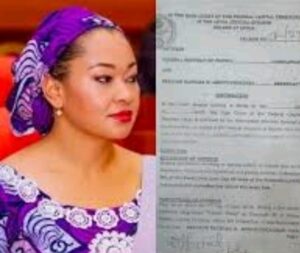FG Files Two Criminal Charges Against Senator Natasha Akpoti-Uduaghan
 The Federal Government has filed two separate criminal defamation charges against Senator Natasha Akpoti-Uduaghan, over allegations she made against Senate President Godswill Akpabio and former Kogi State Governor Yahaya Bello.
The Federal Government has filed two separate criminal defamation charges against Senator Natasha Akpoti-Uduaghan, over allegations she made against Senate President Godswill Akpabio and former Kogi State Governor Yahaya Bello.
The charges, filed by the Department of Public Prosecutions under the Ministry of Justice, stem from statements the Senator made during a live interview on Channels Television’s Politics Today on April 3, as well as a phone conversation recorded on March 27.
In the televised interview, Senator Natasha alleged that both Akpabio and Bello were planning to assassinate her. The charges accuse her of criminal defamation in violation of Sections 391 and 392 of the Penal Code.
According to court documents, the first case, FCT/CR/297/2025, is scheduled for arraignment on June 19, 2025, before the Federal Capital Territory High Court. The second case, FHC/ABJ/CR/195/2025, will come up for hearing on June 30, 2025, at the Federal High Court in Abuja.
At a preliminary hearing held on Monday, June 16, the court refused a prosecution request to issue a bench warrant for the Senator’s arrest.
Justice Christopher Oba noted that the charges had only just been served to the defendant’s counsel and granted an adjournment to allow proper preparation.
Senator Natasha, who represents Kogi Central, confirmed receipt of the court summons and described the case as an attempt to silence her.
“I believe in the judiciary. We shall appear in court and defend the truth,” she said in a statement issued shortly after the hearing.
The prosecution has listed Akpabio and Bello as witnesses in the cases.
The development has sparked widespread debate, with some viewing it as a politically motivated attack on a vocal female senator, while others see it as a necessary step to curb unverified public accusations against top officials.
The outcome of the cases will be closely watched, as they raise significant questions about the balance between freedom of expression and protection of reputations in Nigeria’s evolving democratic landscape.







